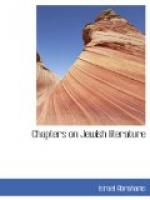KIMCHI FAMILY.
Graetz.—III, p. 392 [404].
SPANISH-JEWISH EXEGESIS AND POETRY.
Steinschneider.—Jewish Literature, pp. 141, 146-179.
CHAPTER XI
RASHI AND ALFASSI
Nathan of Rome.—Alfassi.—Rashi.—Rashbam.
Before Hebrew poets, scientists, philosophers, and statesmen had made Spain famous in Jewish annals, Rashi and his school were building up a reputation destined to associate Jewish learning with France. In France there was none of the width of culture which distinguished Spain. Rashi did not shine as anything but an exponent of traditional Judaism. He possessed no graces of style, created no new literature. But he represented Judaism at its simplest, its warmest, its intensest. Rashi was a great writer because his subject was great, not because he wrote greatly.
But it is only a half-truth to assert that Rashi had no graces of style. For, if grace be the quality of producing effects with the least display of effort, then there was no writer more graceful than Rashi. His famous Commentary on the Talmud is necessarily long and intricate, but there is never a word too much. No commentator on any classic ever surpassed Rashi in the power of saying enough and only enough. He owed this faculty in the first place to his intellectual grasp. He edited the Talmud as well as explained it. He restored the original text with the surest of critical instincts. And his conscience was in his work. So thoroughly honest was he that, instead of slurring over difficulties, he frankly said: “I cannot understand ... I do not know,” in the rare cases in which he was at a loss. Rashi moreover possessed that wondrous sympathy with author and reader which alone qualifies a third mind to interpret author to reader. Probing the depth of the Talmud, Rashi probed the depth of the learned student, and realized the needs of the beginner. Thus the beginner finds Rashi useful, and the specialist turns to him for help. His immediate disciples rarely quote him by name; to them he is “the Commentator.”
Rashi was not the first to subject the Talmud to critical analysis. The Gaonim had begun the task, and Nathan, the son of Yechiel of Rome, compiled, in about the year 1000, a dictionary (Aruch) which is still the standard work of reference. But Rashi’s nearest predecessor, Alfassi, was not an expounder of the Talmud; he extracted, with much skill, the practical results from the logical mazes in which they were enveloped. Isaac, the son of Jacob Alfassi, derived his name from Fez, where he was born in 1013. He gave his intellect entirely to the Talmud, but he acquired from the Moorish culture of his day a sense of order and system. He dealt exclusively with the Halachah, or practical contents of the Rabbinic law, and the guide which he compiled to the Talmud soon superseded all previous works of its kind.




